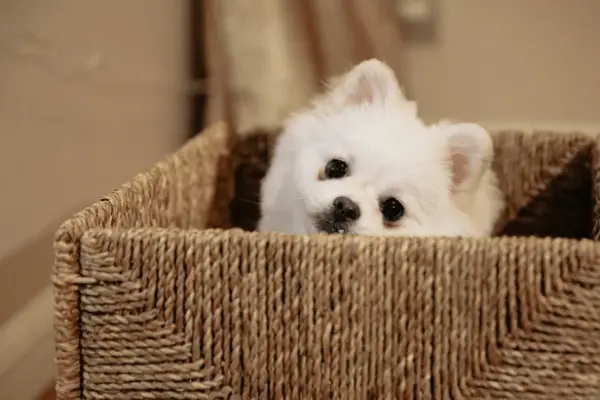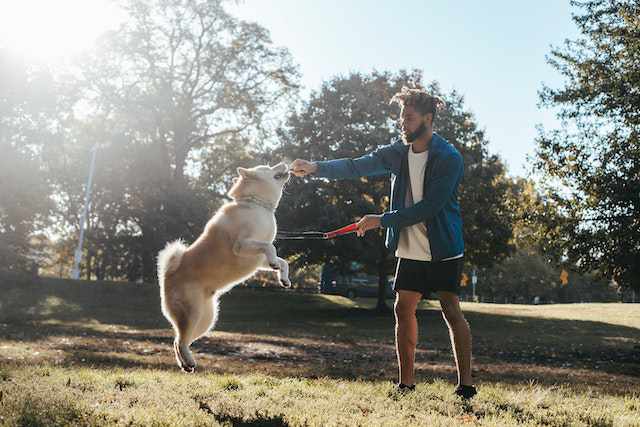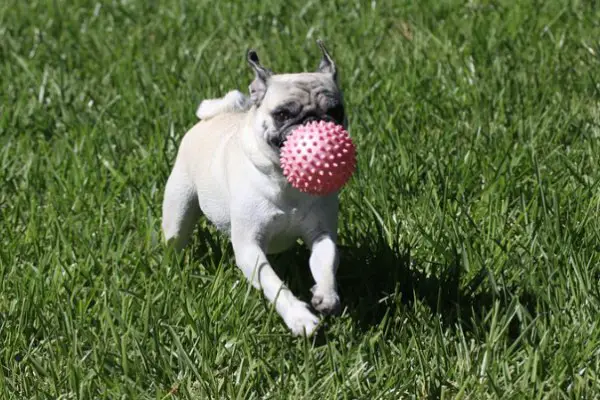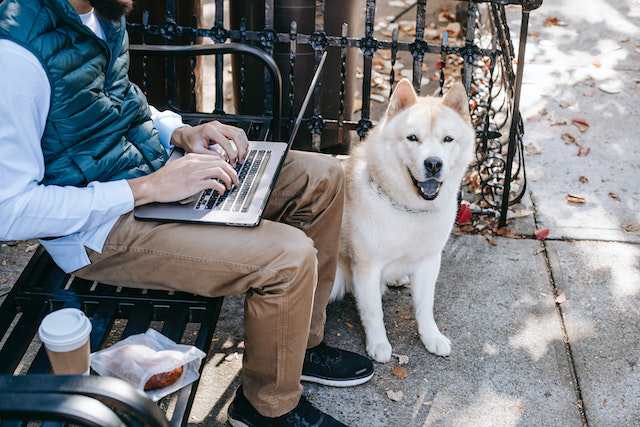8 Signs Of Pomeranian Separation Anxiety & Tips

Separation anxiety affects most small dog breeds, and Pomeranians are no exception, therefore, let’s discuss Pomeranian separation anxiety.
We’ll go over all of the main indicators of separation anxiety in Pomeranians, as well as some of the most prevalent causes of separation anxiety, in this piece.
We’ll also go through some of the most prevalent methods for controlling, preventing, and resolving separation anxiety in Pomeranians.
Let me first explain Pomeranian separation anxiety so you may better comprehend it!
Pomeranian Separation Anxiety
When Pomeranians are separated from their owners for an extended period of time, or even when they are left alone for an extended amount of time, they develop separation anxiety.
Separation anxiety in Pomeranians manifests itself in biting, nipping, barking, self-isolation, and destructive chewing.
Let’s look at some typical reasons for Pomeranian separation anxiety now that you know what it is.
Signs of Pomeranian separation anxiety
Here are some of the most prevalent indications of separation anxiety Pomeranian to be aware of:
1. Frequent scratching of walls or doors when left alone
When your Pom is frustrated or puzzled about you leaving them alone, he will scratch doors or walls to relieve himself.
Separation anxiety causes tension and pain in Pomeranians, which can lead to clawing at doors and walls.
If your Pomeranian has separation anxiety, you’ll notice him clawing the exit door as you leave for work.
Your Pomeranian may also be spotted clawing at the walls, which is a sign of uneasiness caused by being alone.
It’s a clue that your Pomeranian is suffering separation anxiety if you arrive home to find scratches on your walls or doors.
2. Destructive chewing when left alone
Depression, stress, and loneliness are the most common reasons for harmful chewing, all of which can be precipitated by separation anxiety.
Something is wrong if your Pom is nibbling on everything he sees. It might be a sign of separation anxiety.
Spraying areas where you don’t want your Pom to chew or hide your belongings, like as computer wires, has been advised, however, I propose addressing this behavior.
Rather than spraying or concealing the problem, figure out what’s causing the destructive gnawing and fix it once and for all.
If you want your Pom to keep away from your valuables or if you want to solve the chewing problem, give him something to chew on.
3. Frequent house accidents when left alone
Assume your Pom is entirely housebroken, but he still has accidents when you leave the house and return.
This is a clear sign that your Pom is worried about you while you’re away, and if it’s not addressed, things will only become worse.
Keep an eye on your puppy or adult Pom if he or she becomes nervous and starts eating his or her own feces.
Regardless of how inconvenient this symptom is, you may take actions to avoid it or just heal the underlying condition, which may be a source of concern.
4. Frequent freezing on owner’s arrival
Your Pom freezes or becomes rigid when you get home from work or leave because he is afraid of being alone.
Freezing in your Pom all the time can be dangerous for both you and your Pom since it can develop into behavioral problems like biting.
If your Pom continues to freeze needlessly as you move away, it’s an indication that he’s anxious and won’t be able to control the situation, which might result in a bite.
When their owners leave or return, Pomeranians with separation anxiety are known to freeze needlessly, which is a definite indicator of separation anxiety.
5. Frequent self-isolation on owner’s arrival
Self-isolation in Pomeranians can be prompted by a variety of circumstances, the most prevalent of which are separation anxiety and fear.
When a Pomeranian feels afraid, he may hide in a small chamber or a piece of the owner’s clothing that smells like him.
Curled up beneath the table or somewhere in the home, your Pom may urinate for hours needlessly.
Don’t ignore it if your Pomeranian begins to hide unnecessarily; instead, try to figure out why.
This is one of the most evident signs of separation anxiety in a Pomeranian.
6. Digging up its bed or fence base when left alone
One of the most typical causes of your Pomeranian digging up your yard, fence posts, bed, or basement is separation anxiety.
They dig to keep themselves engaged and away from boredom or loneliness when they are bored or have nothing else to do.
As a result, if you return home to find your Pomeranian digging in your yard, cellar, bed, or fence base, you must intervene and try to address separation anxiety.
That’s a solid sign your Pomeranian is bored and ignoring it will only worsen the situation.
Here are some common reasons why Pomeranians dig.
7. Increased clingy behavior during owner’s departure
When your Pomeranian is terrified of being apart from you, he will try all he can to escape the house and find you.
Your Pomeranian may damage himself by slamming his head and teeth against the cage bars in an attempt to persuade him to go because he is afraid of being alone.
If your Pomeranian tries to flee the house every time you leave, don’t ignore it; it might progress to undesired behavior.
This is a major issue since it indicates that your Pomeranian is afraid of being alone, which can lead to separation anxiety.
8. Increased whining behavior on owner’s departure
Your Pomeranian may whine at any time if he is furious, worried, or suffering from separation anxiety.
If the stressor is anything like loud noises that your Pom can’t get away from, whining will almost always be followed by pacing.
It’s most likely stress if your Pomeranian isn’t wailing because he has to go outside or is in pain.
When dogs are stressed out as a result of separation anxiety, they might lose control of their natural whimpering.
However, it is a sign that something is wrong with your Pomeranian’s surroundings. Anxiety can manifest itself in a variety of ways, one of which is whining.
Causes of Pomeranian separation anxiety
You should be aware of the following common reasons for separation anxiety in Pomeranians:
- Leaving your Pomeranian alone over an extended time.
- Continues changing of your Pomeranian feeding schedule.
- The death of a Pomeranian beloved owner.
- Boredom and loneliness.
- A traumatic experience.
- Constant changes in your environment.
- Change of Ownership.
- A change in location or city.
- Pomeranian’s inability to hear or weak vision.
- Insufficient mental stimulation over time.
How to prevent Pomeranian separation anxiety
If your Pomeranian is already suffering from separation anxiety, the two most frequent ways to alleviate it are to contact your veterinarian and spend time with your Pom.
Separation anxiety in Pomeranians can be prevented or reduced in a number of methods, some of which are described below:
1. Provide a clear window view of the outside world
If you live in a busy neighborhood, install a clear window view to guarantee your Pom has an excellent view of the outside world.
From the window, your Pom may watch passers-by as well as birds.
To keep your Pom from barking at other dogs from the window, you must socialize them.
Make sure your Pom can climb up and down the clear glass-covered window with ease.
2. Desensitization
Teach your Pom that there are certain benefits to being apart. Begin by leaving him for short amounts of time and progressively expand your time away from him.
If your puppy is already conditioned to go into stress mode when you leave him, consider giving him a high-value reward that he enjoys and that you only use for essential lessons and rewards.
If you offer him a special treat right before you leave, he could start to look forward to it.
Desensitizing your puppy to the signs that you’re going might also help him cope with separation anxiety.
3. Hire a dog sitter
After crate training and other approaches, this should be your final resort.
If you’ll be gone for the bulk of the day, consider hiring a pet sitter for your Pomeranian.
Depending on your state, agreements, and who would watch your Pomeranian, a pet sitter for your Pomeranian will pay between $20 and $35.
As a consequence, your Pomeranian will be visited on a regular basis by the pet sitter while you are away till you return.
4. Invest in pet cameras and dispenser
This is a terrific technique to keep your Pomeranian occupied while you’re away from home; Pomeranians enjoy treats and food, so use those to keep them occupied.
As a result, you’ll have to be cautious; you may program the dispenser to release your Pom treats over time.
Another alternative is to buy one of the Amazon-available remote cameras.
You’ll be able to view and talk to your dog while you’re at work. This might offer you a significant amount of relief.
These dog cams have excellent Amazon ratings and might be a good option if you intend to leave your dog alone at home for a long period of time.
A suggested treat dispenser is available on Chewy, and this one is also available on Amazon.
5. Provide a safe and calming spot
Make your Pomeranian’s environment as relaxing and enjoyable as possible.
While creating a potentially stressful atmosphere for your Pom, you should bring the same bed, blanket, or mat with you.
Reward your Pom for soothing actions on the mat on a frequent basis, even if stress levels are low, to help your Pom associate the mat with relaxation.
When they leave the house, go to the vet, or are presented with anxiety triggers, they have a secure place to go.
6. Start proper crate training sessions
Crate training is a popular puppy training technique for a variety of issues, including separation anxiety.
Crate training may provide a safe and tranquil environment for your Pomeranian when you’re gone for an extended period of time.
The goal is for the dog to link fun stuff like chew toys and food-releasing puzzle games with his kennel, making him want to spend time there.
When dogs are left alone, they may feel safer and more at ease, so keep an eye on your puppy’s behavior to see whether his anxiety symptoms improve or worsen.
7. Teach your Pomeranian to sit and watch TV
Another common way to help Pomeranians with separation anxiety is to train them to associate calmness with watching television or dog shows.
To assist your Pomeranian to relax and watch while you’re gone, you may show them a selection of dog shows.
Get as many dog movies as you can and let your dog choose the ones that will keep them engaged and quiet.
While you’re doing something else, teach your Pomeranian to sit and watch some dog shows on TV.
As a consequence, while you’re away, your Pom will love watching animated dog programs and will remain calm.
8. Create and stick to a daily schedule
Make time for your Pomeranian to play, promenade, play games, and eat. There should be enough time for each and every task during the day.
Because your Pomeranian will always know what to expect, he will be more relaxed. Keep them active and interested at all times.
Your Pomeranian will never be bored or notice your absence since he will be occupied for most of the day.
Make a daily schedule for you and your Pomeranian that works for both of you, and delegate as much as you can.
When it’s time to eat, don’t procrastinate; instead, practice until your Pom is at ease.
The majority of your issues will be resolved if you and your Pom devise a schedule that works for both of you.
9. Invite your family member or friend to help
If you have relatives or friends nearby, you can enlist their assistance in sitting your Pomeranian until you return from your trip.
Pomeranians are a gregarious breed that can get along with people if properly socialized.





![Are Pomeranians Aggressive [Triggers & Control Tips] Are pomeranians aggressive](https://petcreeks.com/wp-content/uploads/2022/01/Are-pomeranians-aggressive.jpg)
